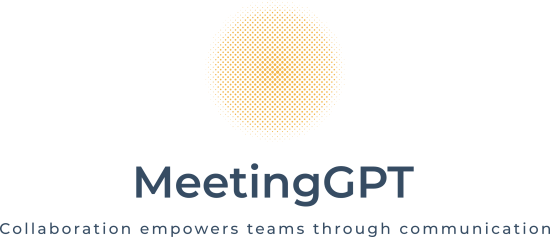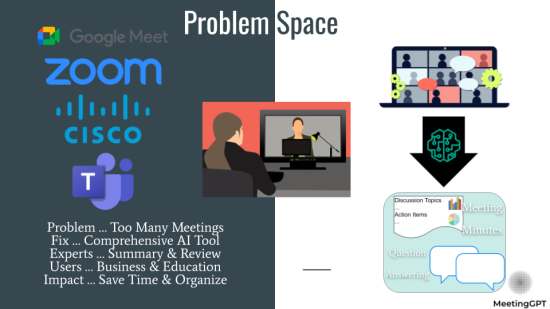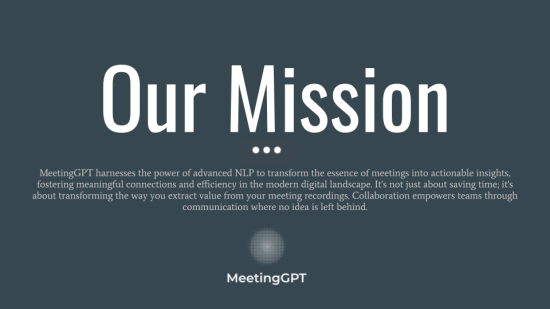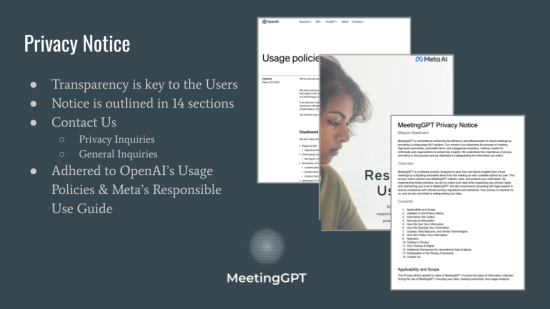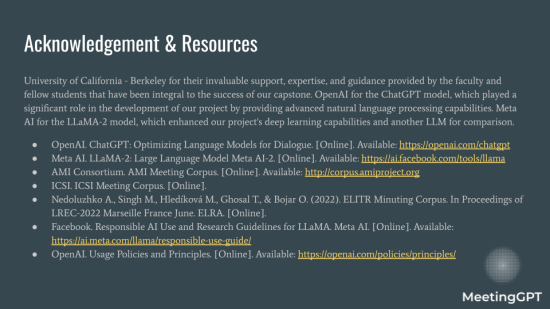MeetingGPT: Collaboration empowers teams through communication
NLP Solution for Extracting Key Insights from Online Meetings
Problem & Motivation
This capstone project addresses the critical challenge of enhancing the documentation and dissemination of key insights from virtual meetings in various professional and academic settings, where meetings are prevalent, and repeat viewings are limited.
As remote work, virtual collaboration, and online education continue to evolve, the need for efficient meeting documentation becomes increasingly pronounced. Tools like Microsoft Teams, Zoom, and Google Meet can record meetings and generate transcripts, but note-taking during discussions remains highly manual, error-prone, and distracting from the conversation.
We introduce MeetingGPT, an innovative AI summarization platform that leverages the state-of-the-art power of large-language-models to streamline your post-meeting experience. This tool processes your recordings to generate concise minutes, action items, and key topics, and even answers the questions you might have about the discussion. Imagine having the ability to automatically-generate a comprehensive summary, freeing up your valuable time and providing instant access to the essential insights from your meetings.
Data Source & Data Science Approach
|
Corpus
|
# of Meetings
|
Meeting Durations
|
# of Participants
|
Domain
|
|
AMI
|
138
|
10-50 mins
|
4
|
Industrial product design
|
|
ICSI
|
61
|
30-100 mins
|
4-9
|
Academic research
|
|
ELITR
|
120
|
10-50 mins
|
2-14
|
Computer science
|
|
Capstone Project Meetings
|
15
|
45-60 mins
|
4
|
Data Science
|
Four Technical Meeting Datasets used for model fine-tuning & evaluation throughout the project
Datasets include wide range of Meeting Duration, # of Participants & Technical topics
Evaluation
% Acceptable Scoring Ground Rules:
For each of the meeting, the team scored each subsections w/ a 0, 0.5 or 1 score:
- 0 → Unacceptable – Minimal/No output generated
- 0.5 → Moderately Acceptable – Output generated, but the content has one primary issue
- 1 → Fully Acceptable - Output generated, formatted per intent w/ content that makes sense
We felt that alongside the outputs being accurate these were important metrics for the user experience & feasibility of our solution.
In Week 10 we had been asking 5 separate prompts for each sub-section which drove up response time and cost. We have since consolidated all of our questions into one carefully crafted multi-faceted prompt that required a number of iterations to retain the accuracy of outputs, but in much less time, with GPT’s average response time down to 12 seconds.
This change to our design also lowered our cost considerably, but in making our prompt lengthy we drove up the amount of transcripts that had to be truncated to be passed to the LLMs.
In the end, all of the metrics we evaluated apart from cost point to GPT as the optimal solution so that is what we ultimately put into our final design.
Key Learnings & Impact
MeetingGPT has made significant progress in addressing the needs of various users groups. For corporate professionals it will be key for effienct review and extraction of key points supprting time management. Education instructors and students have benefits from engagement analytics and meeting recaps for learning. General users have found value in the Q&A features, visual analytics to simplify reviewing meetings. Through the production of this program we have learned a great deal on a full pipeline and the complexities associated with it. With streamlined systems and products we are able to expedite what was once a rigorous software engineering process. We gained insight into produciton timeline and prioritizing efforts of features to maintain the scope. This current platform has transformed how we approach virtual meetings and the development of designing a LLM processing product.
Acknowledgements
University of California - Berkeley for their invaluable support, expertise, and guidance provided by the faculty and fellow students that have been integral to the success of our capstone. OpenAI for the ChatGPT model, which played a significant role in the development of our project by providing advanced natural language processing capabilities. Meta AI for the LLaMA-2 model, which enhanced our project's deep learning capabilities and another LLM for comparison.











